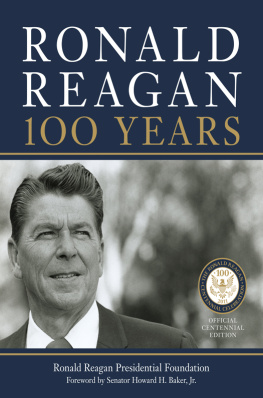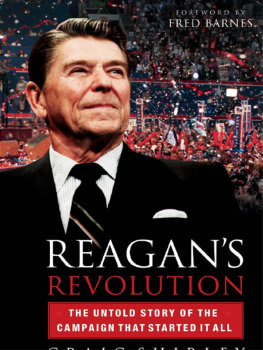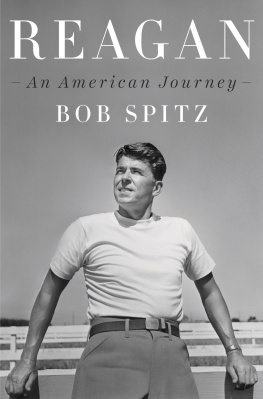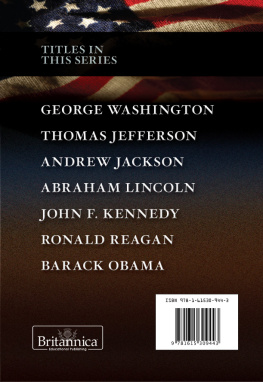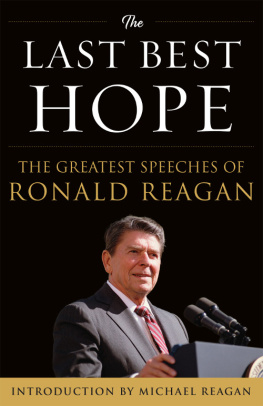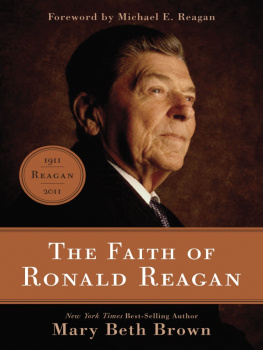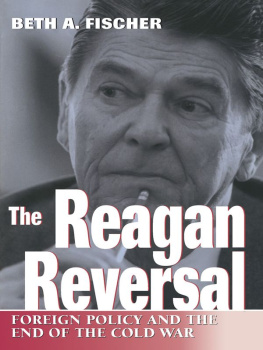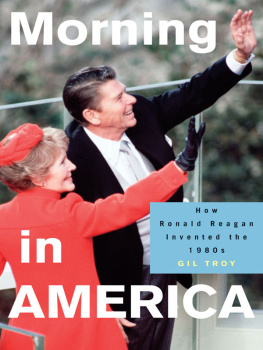The Reagan Era
THE REAGAN ERA
A History of the 1980s
Doug Rossinow

Columbia University Press
New York
Columbia University Press
Publishers Since 1893
New York Chichester, West Sussex
cup.columbia.edu
Copyright 2015 Doug Rossinow
All rights reserved
Library of Congress Cataloging-in-Publication Data
Rossinow, Douglas C. (Douglas Charles)
The Reagan Era : a history of the 1980s / Doug Rossinow.
pages cm
Includes bibliographical references and index.
ISBN 978-0-231-16988-2 (cloth : alk. paper) ISBN 978-0-231-53865-7 (electronic)
1. United StatesPolitics and government19811989. 2. United StatesForeign relations19811989. 3. Reagan, Ronald. I. Title.
E876.R676 2015
973.927dc23
2014011193
A Columbia University Press E-book.
CUP would be pleased to hear about your reading experience with this e-book at .
COVER PHOTO: Courtesy Ronald Reagan Library
COVER DESIGN: Milenda Nan Ok Lee
References to websites (URLs) were accurate at the time of writing. Neither the author nor Columbia University Press is responsible for URLs that may have expired or changed since the manuscript was prepared.
This book is dedicated to the class of 1984.
MR. WORLDLY-WISEMAN: How camest thou by thy burden at first?
CHRISTIAN: By reading this Book in my hand.
John Bunyan, The Pilgrims Progress
Contents
Some of the smartest historians working today read all or much of this book as I wrote it. Robert McMahon, Eric Arnesen, and Rebecca Lowen took extraordinary time and care in reading every word and provided an awesome level of response, as did some anonymous readers. Ken Lipartito, Andrew Preston, Alan Brinkley, Jeanne Grant, and Jon Zimmerman read big pieces and, as the saying goes, rescued me from embarrassment on a number of key points. Geri Thoma represented this project faithfully. Philip Leventhal, my editor at Columbia University Press, showed unwavering enthusiasm and made many very wise suggestions. Philip is that rare thing in intellectual lifea listener, not just a talker. I revised the manuscript in the welcoming embrace of the Institute for Archaeology, Conservation, and History at the University of Oslo, during a splendid semester there as a Fulbright Scholar. My profound thanks go to Professor Tor Egil Frland, head of the department, for the outstanding hospitality he showed me and my family, and to the whole staff and faculty in Oslo. I also owe thanks to students at Metropolitan State University who have taken my course From Reagan to Obama: America Since 1980. They helped me refine my ideas and express them clearly. Annalisa Zox-Weaver proved a copyeditor nonpareilshe was more knowledgeable about the subject matter than I had a right to expectand ironed out my maladroit phrasing with diligence and good humor. The entire production process at Columbia was coordinated by the splendid Leslie Kriesel, who, in one especially heroic moment, really saved my bacon.
Words will not express how much better Rebecca Lowen made this book. She was patience itself in her detailed and reflective reading of more drafts of chapters, and then of the whole manuscript, than I can recount. Rebecca went over each chapter with incredible care and thoughtfulness, gently pointing out numerous ways I could strengthen my work. No one else could have done this. This book topic might have been the last one to which she would have chosen to devote so many hours and days, but she did so without a word of complaint. For this, and for more important things, she has my everlasting gratitude as well as my love.
In 1984, I turned eighteen and voted for Ronald Reagan. I made the same choice as did about six of every ten American voters aged eighteen to twenty-four. Reagan affirmed values that attracted me: unqualified patriotism, national strength, and individual empowerment. I was not very interested in Reagans specific policy stands. I view many things about Reagan and the 1980s differently today. But now, just as I did then, I see the 1980s as an era of crucial choices for Americansa time of political transformation and of alterations in social values and ways of life. At the center of these changestheir symbol, their championstood Ronald Wilson Reagan.
Reagan is part of a select group of political leaders, including Thomas Jefferson and Woodrow Wilson, whose names became watchwords for political creeds and stances toward society, even toward the world. Judging Reaganism is more important than judging Ronald Reagan as an individual, although any sound guide to the 1980s must also show Reagan for who and what he truly was. Reaganism was a particular variety of American conservatism, and the 1980s were its heyday. None of Reaganisms basic features was new in 1980, and several of them remained prominent in American conservatism after 1990. But in the decade of the 1980s, these elements came together in a specially cohesive and potent way, in response to the eras political and social circumstances, forming a political identity that was also fueled and shaped by Reagans success.
Reaganism consisted of a few core components: an insistence that unfettered capitalism is both socially beneficial and morally good; a fierce patriotism that waves the flag, demands global military supremacy, and brooks no criticism of the United States; and a vision of society as an arena where individuals win or lose because of their own talents and efforts. On these articles of faith virtually all of Reaganisms adherents agreed. On matters of culture, Reaganism was split down the middle, with the fault line the question of hedonism. Some conservatives in the 1980s reveled in conspicuous consumption, even decadence (a word that took on positive connotations in advertising copy during the 1980s). Others wished to quarantine hedonism in the economic realm, preserving culture and family life as redoubts of warmth, order, and piety against the tides of an individualistic, coarsening world. Both hedonists and traditionalists felt sure that their cultural stance was the authentically Reaganite one, which made Reaganism, on the question of culture, a kind of dual persuasion. But during the 1980s, this rift in conservative ranks was overshadowed by conservative unity on economics and foreign policy.
Reagan often presented himself as an eighteenth-century radical in the style of Thomas Paine, author of Common Sense. He was fond of Paines words of inspiration to the American rebels of 1776, We have it in our power to begin the world over again. Reagan quoted Paines words in November 1979, in the speech formally announcing that he was running for the presidency in 1980; he did so again in his address to the Republican National Convention in July 1980, where he was nominated. By 1980, Reagan had been making the same case for nearly thirty years: that the American legacy of liberal idealism, grounded in the dream of individual freedom from tyranny, now had its natural home among conservatives.
In the 1980s, conservatives succeeded in remaking large parts of American life. They reshaped American politics, working an alchemy that transmuted conservative dogmaon the wisdom of low income taxes, the special virtue of entrepreneurs, the parasitic character of government, the need for overwhelming (rather than merely great) military strength, the dependence of social health on proper values, and the nuclear family as the building block of societyinto common sense. Reagan and his followers scored many victories, large and small, in the U.S. political system during the 1980s. Along the way, they shifted American political debate onto Reagans chosen terrain, and Reagans liberal enemies found themselves permanently on the defensive.
Next page


